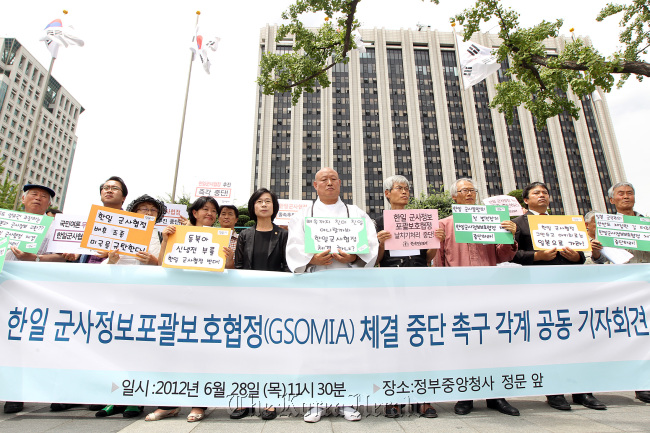Two countries set to sign defense intelligence agreement on Friday
The Korean government will push ahead to sign the first military accord with Japan on Friday, officials said, brushing aside growing criticism over its clandestine and hasty handling of the politically sensitive issue.
The Cabinet on Tuesday approved the General Security of Military Information Agreement to facilitate the sharing of intelligence on North Korea and search and rescue-related missions.
The Foreign Ministry said Thursday Ambassador to Japan Shin Kak-soo and Japanese Foreign Minister Koichiro Genba are to sign the landmark agreement in Tokyo shortly after Japan’s endorsement expected early in the day.
 |
Civic activists protest South Korea signing a General Security of Military Information Agreement with Japan outside the government complex, in central Seoul on Thursday. (Yonhap News) |
“We’re expecting to be able to sign it late Friday so long as no untoward problem occurs,” spokesman Cho Byung-jae said at a regular media briefing.
The two governments said the agreement would establish an institutional framework for the classification, protection and handling of information that they had already been exchanging.
Civic activists and opposition lawmakers object the military cooperation due to historical and territorial disputes and the possibility of exasperating North Korea and China.
They also blasted the Cabinet for keeping the crucial arrangement under wraps while approving it only about a month after pledging a “cautious” approach.
Defense Minister Kim Kwan-jin postponed the signing originally scheduled for late last month due to domestic controversy.
Anti-Japan sentiment lingers due to Tokyo’s recurrent sovereignty claims over the Korean islets of Dokdo, distortions of historical facts in school textbooks, and failure to apologize for conscription of laborers and sex slaves during its colonial rule between 1910-45.
“Having passed the pact behind the scene, the government did not even bother to announce the meeting results,” said Rep. Park Jie-won, floor leader of the main opposition Democratic United Party.
The Korean Council for Women Drafted for Military Sexual Slavery by Japan said “(The accord) will build up military conflicts in Northeast Asia and open the sluice gate of Japan’s militaristic ambitions.”
Uriminzokkiri, Pyongyang’s propaganda website, branded the intelligence deal “quislingism.”
“The GSOMIA is an anti-national agreement designed to sell the country and cooperate in confronting (North Korea’s) provocations on the pretense of comprehensively exchanging military information,” the website said.
Speculation is rising that the U.S. may have heaped pressure on Seoul at a June 14 meeting in Washington between the two countries’ foreign affairs and defense ministers.
The U.S. has been calling for closer defense cooperation between its key allies.
About 28,500 U.S. troops, largely consisting of ground soldiers, are stationed here. Roughly another 50,000 navy, air force and marines are serving in Japan.
“We welcome closer ties between our allies, Japan and the Republic of Korea,” a U.S. State Department official was quoted as telling Yonhap News in Washington.
Since January 2011, the two countries have been pushing to forge the intelligence accord and the Acquisition and Cross-Servicing Agreement, which enables militaries to provide services and supplies to each other more efficiently while on overseas missions.
Japan’s military is known to own a slew of high-tech surveillance equipment. Among them are several early warning aircrafts and six Aegis destroyers featuring ultramodern radar systems, giving Tokyo an edge in monitoring developments in the nuclear-armed North Korea.
Korea has signed bilateral intelligence pacts or memoranda with 24 countries including the U.S., Canada, Australia, Russia and Ukraine, according to the Foreign Ministry.
It also has the logistics agreement with 10 countries and is currently in negotiations with an additional 10, the Defense Ministry said.
Though they are relatively low-level military agreements, critics fear that they may evolve to more advanced, combat-focused deals such as one allowing the Japanese Self-Defense Forces on the Korean Peninsula.
Given persisting opposition, the two governments have decided to postpone the ACSA for the time being, a senior defense ministry official told media on condition of anonymity.
“We’ll reconsider it when historical issues like comfort women come within the public’s understanding,” he said.
By Shin Hyon-hee (
heeshin@heraldcorp.com)







![[Today’s K-pop] Blackpink’s Jennie, Lisa invited to Coachella as solo acts](http://res.heraldm.com/phpwas/restmb_idxmake.php?idx=644&simg=/content/image/2024/11/21/20241121050099_0.jpg)
